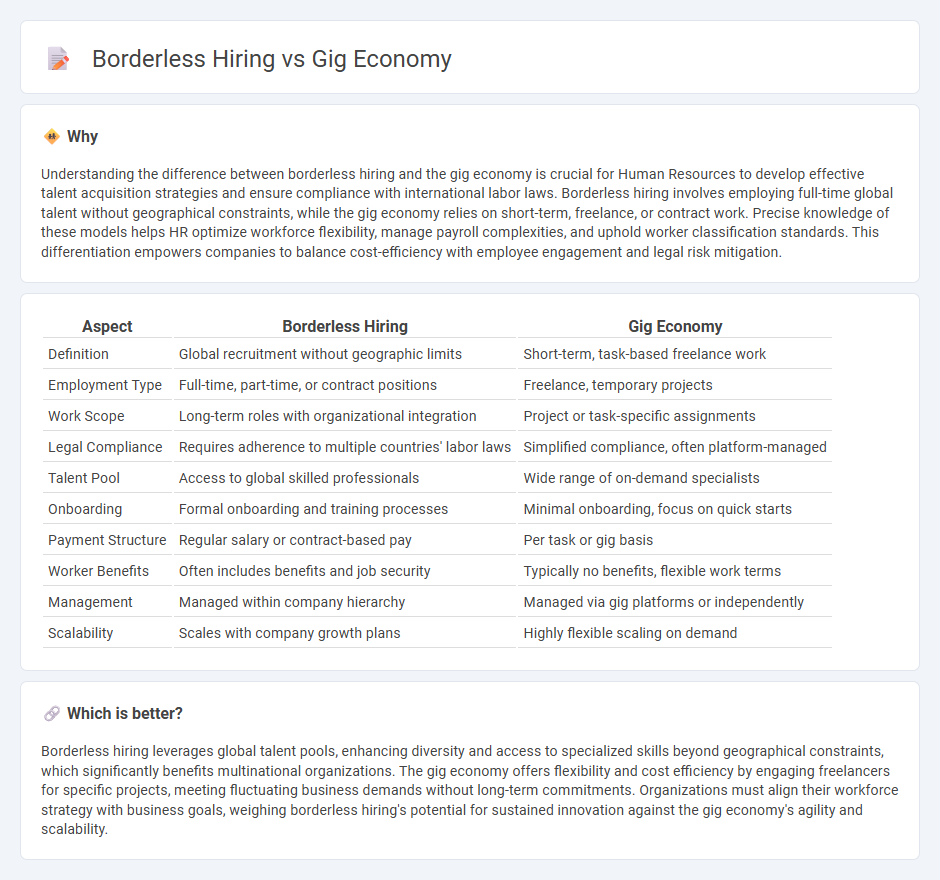
Borderless hiring enables companies to recruit talent globally without geographical constraints, thereby accessing diverse skill sets and increasing workforce flexibility. The gig economy emphasizes short-term, project-based work, offering businesses agility but often at the cost of long-term employee engagement. Explore the evolving landscape of human resources to understand how these models can optimize your talent strategy.
Why it is important
Understanding the difference between borderless hiring and the gig economy is crucial for Human Resources to develop effective talent acquisition strategies and ensure compliance with international labor laws. Borderless hiring involves employing full-time global talent without geographical constraints, while the gig economy relies on short-term, freelance, or contract work. Precise knowledge of these models helps HR optimize workforce flexibility, manage payroll complexities, and uphold worker classification standards. This differentiation empowers companies to balance cost-efficiency with employee engagement and legal risk mitigation.
Comparison Table
| Aspect | Borderless Hiring | Gig Economy |
|---|---|---|
| Definition | Global recruitment without geographic limits | Short-term, task-based freelance work |
| Employment Type | Full-time, part-time, or contract positions | Freelance, temporary projects |
| Work Scope | Long-term roles with organizational integration | Project or task-specific assignments |
| Legal Compliance | Requires adherence to multiple countries' labor laws | Simplified compliance, often platform-managed |
| Talent Pool | Access to global skilled professionals | Wide range of on-demand specialists |
| Onboarding | Formal onboarding and training processes | Minimal onboarding, focus on quick starts |
| Payment Structure | Regular salary or contract-based pay | Per task or gig basis |
| Worker Benefits | Often includes benefits and job security | Typically no benefits, flexible work terms |
| Management | Managed within company hierarchy | Managed via gig platforms or independently |
| Scalability | Scales with company growth plans | Highly flexible scaling on demand |
Which is better?
Borderless hiring leverages global talent pools, enhancing diversity and access to specialized skills beyond geographical constraints, which significantly benefits multinational organizations. The gig economy offers flexibility and cost efficiency by engaging freelancers for specific projects, meeting fluctuating business demands without long-term commitments. Organizations must align their workforce strategy with business goals, weighing borderless hiring's potential for sustained innovation against the gig economy's agility and scalability.
Connection
Borderless hiring expands the talent pool by enabling companies to recruit gig workers from global markets, increasing workforce diversity and flexibility. The gig economy thrives on this by providing on-demand, project-based opportunities that cross geographical boundaries, supported by digital platforms and remote collaboration tools. This synergy reduces operational costs and accelerates innovation by leveraging specialized skills worldwide without traditional employment constraints.
Key Terms
Flexibility
The gig economy offers unparalleled flexibility by enabling workers to choose projects and work hours autonomously, accommodating diverse lifestyles and preferences. Borderless hiring expands this flexibility globally, allowing companies to tap into talent pools worldwide while providing employees with opportunities to work from any location. Discover how these models reshape modern workforce dynamics for enhanced adaptability and freedom.
Compliance
Gig economy platforms often face complex compliance challenges related to worker classification, taxation, and labor laws, which vary significantly across jurisdictions. Borderless hiring requires robust global compliance frameworks, including adherence to diverse labor regulations, tax obligations, and data privacy standards in multiple countries. Explore how mastering compliance can optimize hiring strategies in the evolving global workforce landscape.
Talent Pool
The gig economy leverages a flexible talent pool by connecting freelancers with short-term projects, emphasizing rapid skill matching and task-based employment. Borderless hiring expands this scope by accessing global talent pools, enabling companies to recruit specialized professionals from diverse regions without geographic constraints. Explore how broadening your talent pool through borderless hiring can transform workforce strategy.
Source and External Links
Gig Economy - Overview, Advantages, Disadvantages - The gig economy is a flexible labor market where organizations hire independent contractors and freelancers for temporary work through digital platforms, offering services that are cheaper, more efficient, and often more flexible than traditional employment models.
The Pros and Cons of the Gig Economy - The gig economy enables individuals to work on short-term projects or "gigs" instead of traditional full-time jobs, providing flexibility and autonomy, but also raising concerns about job security and benefits for workers.
What is the Gig Economy? - A gig economy is a free market system where temporary positions are common, organizations hire independent workers for short-term commitments, and digital platforms connect customers with gig workers across various industries.
 dowidth.com
dowidth.com